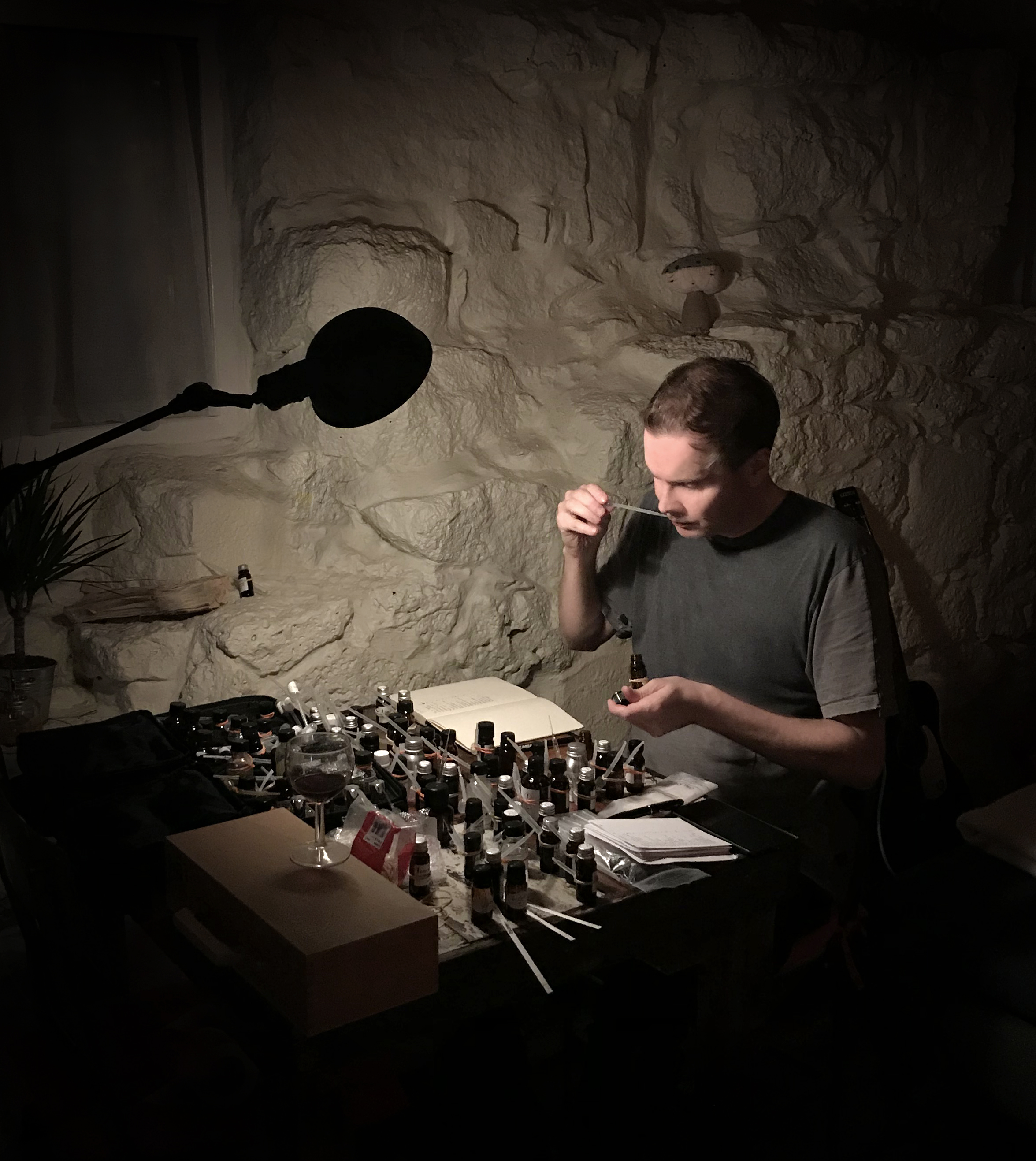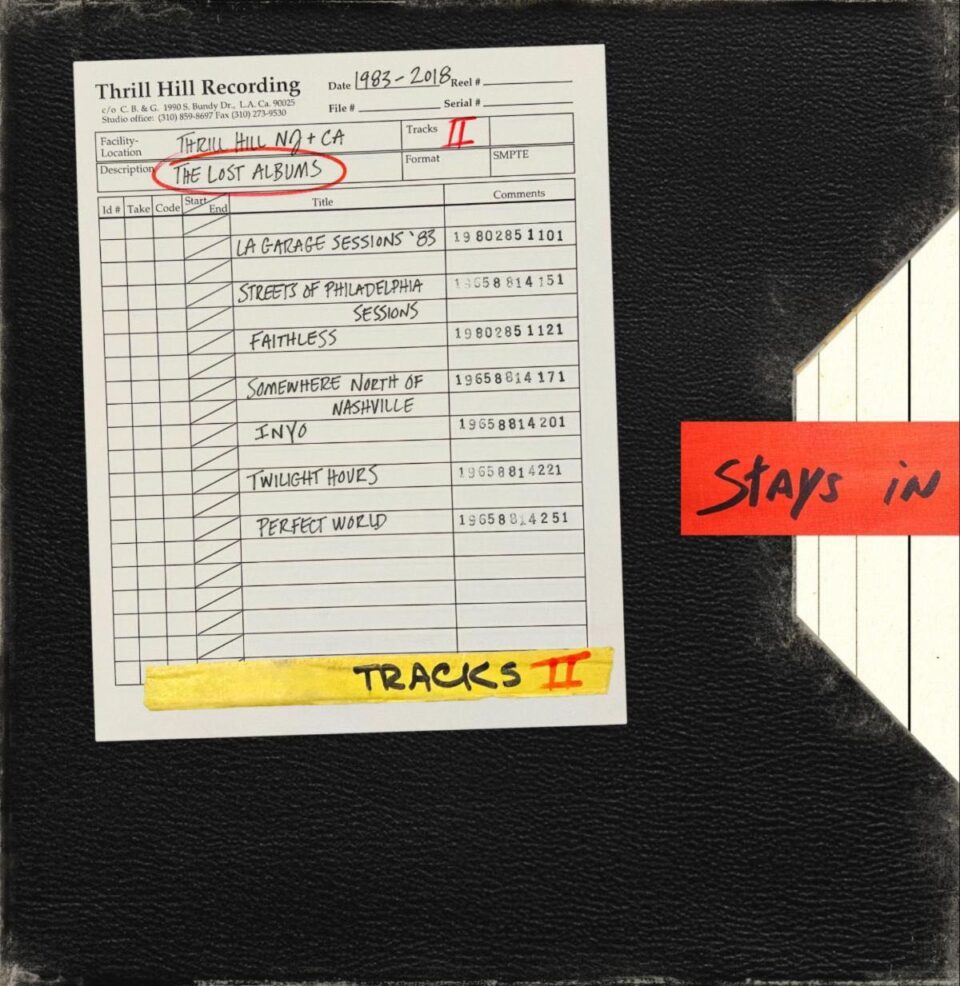This article appears in FLOOD’s Passion Issue #3, powered by Toyota Corolla. Click here to read or download the full issue, or go here.
Have you ever wondered what the second most famous person in Iceland (after Björk) does for fun? We’re talking about Jónsi, the frontman of Icelandic avant-noise band Sigur Rós. The answer? Jónsi makes perfume. The musician began experimenting with essential oils and aroma-chemicals eight years ago. Today, two of his signature perfumes can be purchased from a store operated by his sisters in Reykjavík.
Named Fischer, the family-run business is more of an experimental art space than a traditional mom-and-pop store. Jónsi’s youngest sister Sigurrós—whom the band is named after—manages the space, which is located inside a nineteenth century wooden house that was once Jónsi’s recording studio. Over several bottles of wine in 2017, Jónsi, Sigurrós, and their other two sisters Lilja and Ingibjörg, decided to convert the former studio into a family boutique. Their mother (a seamstress) and father (a carpenter) helped outfit the space, their boyfriends composed a soundtrack that functions as a sound bath, and all four siblings had a hand in creating and curating the beauty products, jewelry, art, video work, and herbal remedies that are now on display and sold there.
Jónsi describes the whole thing as a “sensory experience,” where different sights, sounds and smells stimulate different senses as you progress through the carefully curated space. A perfume showroom displaying his oils, which looks a bit like a medieval laboratory, is located in the building’s basement.
 Jónsi got his introduction to perfume eight years ago when he boiled down and extracted tar from an Icelandic birch tree. The scent had a smokey, leathery smell similar to a campfire, and Jónsi was intrigued by its unrepentant earthiness. As a fragrance, Birch tar is known to blend well with jasmine, sandalwood, and rosemary. He says the processes of making music and perfume appeal to his love of being taken somewhere—both are meditative and immersive, the end result dictated by how your sensors react to the work (though he can’t listen to music while he’s mixing chemicals because it’s “too distracting,” as he puts it). For this same reason, he hasn’t yet combined his two passions, though on the odd occasion he and a group of other musicians have created sound baths and burned incense to enhance the atmosphere for those in attendance.
Jónsi got his introduction to perfume eight years ago when he boiled down and extracted tar from an Icelandic birch tree. The scent had a smokey, leathery smell similar to a campfire, and Jónsi was intrigued by its unrepentant earthiness. As a fragrance, Birch tar is known to blend well with jasmine, sandalwood, and rosemary. He says the processes of making music and perfume appeal to his love of being taken somewhere—both are meditative and immersive, the end result dictated by how your sensors react to the work (though he can’t listen to music while he’s mixing chemicals because it’s “too distracting,” as he puts it). For this same reason, he hasn’t yet combined his two passions, though on the odd occasion he and a group of other musicians have created sound baths and burned incense to enhance the atmosphere for those in attendance.
“You make something out of nothing. It’s invisible and I love that about it,” Jónsi explains, with a chipper tone in his voice that seems at odds with some of the somber interviews he’s done recently in relation to his music. “You create something like music and it’s invisible, but still it moves you in some way. It’s the same with scents: you smell something and it moves you. Maybe you can’t understand why, but it triggers a memory or something.”
His hobby developed into more of an obsession when he started taking chemicals on tour. Between shows with Sigur Rós, he would set up a mini lab in his hotel room and blend oils and aroma-chemicals together in test tubes. “I had a few materials, thirty, forty, fifty or something, and I’d just spread them out,” he explains. “If I had days off, I’d do it in the morning or the night before… It was probably weird for the cleaners, coming in and seeing all this shit lying around,” he adds before chuckling to himself.
“You create something like music and it’s invisible, but still it moves you in some way. It’s the same with scents: you smell something and it moves you. Maybe you can’t understand why, but it triggers a memory or something.”
At his home in Los Angeles, Jónsi has a more sophisticated set up. Among his musical instruments is a perfume organ that holds hundreds of tiny bottles of raw chemicals— many with handwritten labels containing formulas that only Jónsi can translate. The organ performs a similar role to a countertop in a mechanic’s garage; Jónsi uses it to blend oils and chemicals sourced from Iceland and other parts of the world. He notes that it’s much easier to get the materials he needs here in the U.S. “I can buy stuff online,” he says. “I know for my sisters in Iceland, some things are hard for them to import. Some things you can’t fly with.” The logistics of touring the world with a bag of up to fifty oils never seemed to phase him, though.
In Reykjavík, his oils are laid out on a perfume organ crafted from the bones of an actual musical organ. It’s one of the many details that decorate Fischer’s rustic interior, where Jónsi, somewhat reluctantly, sells two of his perfumes. “My sister forced me to release them,” he says of n.23 and n.54. “I’m never happy with anything I do. I’m always really anal about everything.”
“N.23 is pretty good, that’s kind of fruity, smokey,” he describes, cautiously critiquing his own work. “54 is something brutal, I don’t know what it is.” On Fischer’s website, both are described using evocative language. “Smoke in the air and tarred telephone poles,” begins the description of n.23. “In the breeze the feminine fountain pine tickles the top of your skull. A beached whale is about to explode,” it continues.
The description of n.54 reads, “Fresh coat of varnish on a wooden shed. Uprooted moss, wet dirt and vetiver roots. Burnt car tires on hot asphalt and dry patchouli. Heavy, slow-drying oil painting. Icelandic alpine fir, footsteps in frozen grass and salt liquorice. Dirty leather, animalistic musk and ammonia.”
 Jónsi, who is self-taught, says the process of making perfume is extremely delicate. Every drop can change the composition and render a perfume rancid. “Perfumes are twenty to one hundred materials, so if you fuck up one drop, then the whole thing is gone and you have to start again,” he says. “If you want to be proper about it then you should let it mature for a few months, so that all the materials can marinate and fuse together.” He likens the development of perfume to composing a song; both have base notes, a middle, and a treble. It’s about finding the right balance, “a lot of trial and error,” he says.
Jónsi, who is self-taught, says the process of making perfume is extremely delicate. Every drop can change the composition and render a perfume rancid. “Perfumes are twenty to one hundred materials, so if you fuck up one drop, then the whole thing is gone and you have to start again,” he says. “If you want to be proper about it then you should let it mature for a few months, so that all the materials can marinate and fuse together.” He likens the development of perfume to composing a song; both have base notes, a middle, and a treble. It’s about finding the right balance, “a lot of trial and error,” he says.
Jónsi’s next perfume, which will soon be packaged and sold at Fischer, will be his boldest yet, and was perhaps his most challenging to concoct. He had to overcome his disdain for florid, feminine perfumes to satisfy his sisters, who wanted something fresher smelling to counter the other two leathery fragrances. Jónsi describes it as “more of a summery scent.” He admits, “It’s really hard for me to do flowery stuff because I really don’t like flowery perfumes. It’s a really fine line of doing something nice, spicy, and fresh, that doesn’t become too flowery or heavy. It’s a challenge to get it right.”
“Perfumes are twenty to one hundred materials, so if you fuck up one drop, then the whole thing is gone and you have to start again.”
Despite being a connoisseur of fine fragrances, Jónsi doesn’t actually wear other people’s scents. He prefers to use his body as a canvas for his own creations. “I just like wearing my own experiments,” he says. “I’ll put some of a plant in a bottle and spray it on me and see how it is, or I just wear pure chemicals on me to see how they smell on the skin.”
Whether using his nose or his ears, Jónsi clearly knows how to trust his instincts. The music he’s made with Sigur Rós and under his own name has the ability to transport you to another world. His soundscapes, much like the descriptions of his perfume, evoke a sense of wonder. They each have a kind of refined elegance that comes from knowing when a formula has been perfected. FL
This article appears in FLOOD’s Passion Issue #3, powered by Toyota Corolla. Click above to read or download the full issue, or go here.









